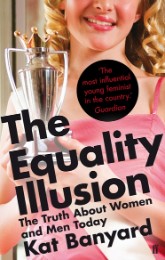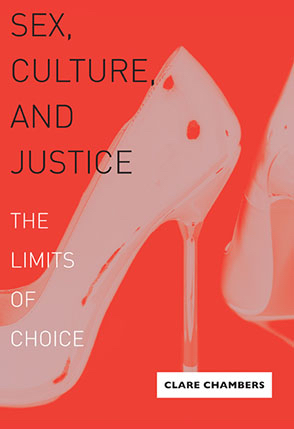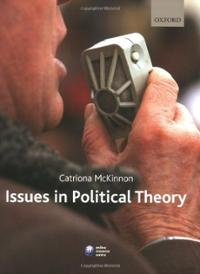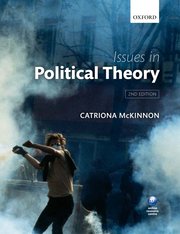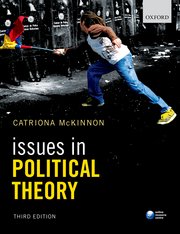all posts on feminism
-
WOW festival

I spoke at the WOW – Women of the World – Festival in Cambridge in March 2015, on a panel on Women’s Bodies, Private Places.
Women’s bodies, who do they belong to? A wide- ranging, multi-generational and diverse panel will explore issues around life as a woman. From boobs and body hair to body image and periods, how have attitudes changed and who decides what’s ‘right’? In conversation will be Dr Clare Chambers, author of ‘Fat is a Feminist Issue’ Susie Orbach, Roz Hardie, CEO of campaign group Object, Debra Bourne from All Walks Beyond the Catwalk, poet, singer, writer and actor Keisha Thompson, Alice Wroe from the Herstory project, trans woman Dr Rachael Padman and Becky Talbot from Dhiverse.
See the programme here.
- all posts on culture and religion, all posts on feminism, all posts on marriage, all posts on social construction, media, read
3am magazine
 An interview with me, focusing on my work in Sex, Culture, and Justice. Read the interview here.
An interview with me, focusing on my work in Sex, Culture, and Justice. Read the interview here.Clare Chambers chews over the core philosophical issues of sex, culture and justice for liberal feminists, brooding on practices of physical modification, social construction’s role in negotiating claims of universalism and tolerance, Foucault and the panopticon, Bourdieu and habitus, Mackinnon’s critique of liberal feminism, taking violence against women seriously, Benhabib’s discourse ethics, how not to be a relativist, of what kind of universality is worth defending and of the state of academic philosophy and feminism. This is a voice from a war zone. Listen up!
-
The Marriage-Free State
 Proceedings of The Aristotelian Society (2013). This paper sets out the case for abolishing state-recognised marriage and replacing it with piecemeal regulation of personal relationships. It starts by analysing feminist objections to traditional marriage, and argues that the various feminist critiques can best be reconciled and answered by the abolition of state-recognised marriage. The paper then considers the ideal form of state regulation of personal relationships. Contra other recent proposals equality and liberty are not best served by the creation of a new holistic status, such as civil union, or by leaving regulation to private contracts. Instead, the state should develop piecemeal regulations that apply universally. You can read the paper and listen to the podcast here or on the OUP Philosophy Festival Reading List here.
Proceedings of The Aristotelian Society (2013). This paper sets out the case for abolishing state-recognised marriage and replacing it with piecemeal regulation of personal relationships. It starts by analysing feminist objections to traditional marriage, and argues that the various feminist critiques can best be reconciled and answered by the abolition of state-recognised marriage. The paper then considers the ideal form of state regulation of personal relationships. Contra other recent proposals equality and liberty are not best served by the creation of a new holistic status, such as civil union, or by leaving regulation to private contracts. Instead, the state should develop piecemeal regulations that apply universally. You can read the paper and listen to the podcast here or on the OUP Philosophy Festival Reading List here. -
The Equality Illusion
-
Andrea Dworkin Commemorative Conference (2006)
The Andrea Dworkin Commemorative Conference was held at the Centre for the Study of Social Justice (CSSJ), University of Oxford, in 2006. You can hear the podcasts of the day here, with thanks to the CSSJ for allowing them to be posted.
Session 1:
Sheila Jeffreys, “Not just about pornography: the radical politics of Andrea Dworkin”Alison Assiter, “Pornography: its significance for feminism”Session 2:
Finn McKay, “Prostitution and Andrea Dworkin’s relevance to young feminists”Valerie Bryson, “Andrea Dworkin, feminist political thought, and the role of men”Session 3:
Michael Moorcock, “Andrea Dworkin’s fiction”
Julie Bindel, “Myths about Andrea Dworkin”
John Stoltenberg, “What Andrea knew about her work”Plenary session:
Professor Catharine A. MacKinnon, “Going Her Own Way”
- all posts on feminism, all posts on social construction, all posts on the body and beauty, listen, media
BBC Radio 4 “Woman’s Hour”
I made a live appearance on BBC Radio 4’s Woman’s Hour, discussing ideas from Sex, Culture, and Justice in the context of a debate on cosmetic surgery and the concept of ‘normal’, on 31st July 2012. You can listen to the debate right here via the sound file below. The segment begins at 33m, I am on at 37m.
-
UK Feminista Thinkpiece
 Edited excerpt from Sex, Culture, and Justice published by UK Feminista as their first Thinkpiece on “Cosmetic Surgery, Culture, and Choice”. Find it here.
Edited excerpt from Sex, Culture, and Justice published by UK Feminista as their first Thinkpiece on “Cosmetic Surgery, Culture, and Choice”. Find it here. - all posts on feminism, all posts on liberalism, all posts on marriage, chapters, feminism, liberalism, publications on marriage
“The Family as a Basic Institution”: A Feminist Analysis of the Basic Structure as Subject
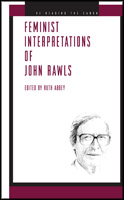 in Ruth Abbey (ed.), Feminist Interpretations of Rawls (Penn State Press, 2013).
in Ruth Abbey (ed.), Feminist Interpretations of Rawls (Penn State Press, 2013).In Section 50 of Justice as Fairness: A Restatement, titled “The Family as a Basic Institution”, John Rawls replies to Susan Moller Okin’s feminist critique of A Theory of Justice. The question of how Rawlsian justice might secure gender equality has been discussed by many feminists, most notably by Okin. However, as I argue in this chapter, the Rawls-Okin debate raises more questions than it answers. Okin criticises Rawls for failing to apply his theory adequately to the family: she criticises not Rawls’s approach in general, but his attitude to the family in particular. Okin argues that a consistent application of Rawlsian theory would secure gender justice, but that Rawls is remiss in refusing such consistency. In fact, as I show, Rawls’s remarks on the family reveal a more fundamental problem with Rawlsian theory than Okin allows. It is not that Rawls fails to apply his theory correctly to the family, but rather that the specific case of the family illustrates deep-seated difficulties with Rawlsian justice as a whole.
The problem, to give an outline, is that Rawls’s ambiguous remarks on the family are comprehensible only at the expense of his fundamental claim that there is something distinctive about the application of justice to the basic structure. Okin criticises Rawls for failing to make good on the fact that the family is part of the basic structure. If he did make good, Okin claims, he would see that the principles of justice must apply to the family in a much more extensive way than he actually allows. As I show, however, the family is one illustration of the fact that how the principles of justice apply to an institution does not depend on whether that institution is part of the basic structure. This is a problem for Rawls because the distinctiveness of the basic structure is a crucial part of the political liberalism which, by the end of his work, has become essential to the Rawlsian project.
In this chapter I first outline Okin’s critique of Rawls in more detail, and provide a valid formalisation of her argument against Rawls. I then examine the main premises of her argument and look for evidence to support Okin’s interpretation of Rawls. I conclude that Okin’s interpretation is flawed but nonetheless highlights problems with Rawls’s claim that the basic structure is the subject of justice. I then consider and reject the argument that Rawls’s theory is consistent according to what I call the “whole structure view”: that the principles of justice apply to the basic structure considered as a whole. Finally, I consider G.A. Cohen’s argument that the basic structure distinction is problematic. I agree with Cohen’s criticism of the distinction, but suggest that Cohen is wrong in situating the problem with the issue of coercion. I conclude that Rawls’s position on justice in the family is at odds with his claim that the basic structure is uniquely the subject of justice.
You can see more about the book here.
-
Feminism
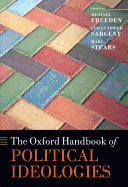 This chapter sets out the state of contemporary feminism, including considering the sense in which it is and is not an ideology. It argues that contemporary feminism must argue against two patriarchal claims: The Prison of Biology and The Fetishism of Choice. In their place, feminism argues for three theses: The Entrenchment of Gender, The Existence of Patriarchy, and The Need for Change.
This chapter sets out the state of contemporary feminism, including considering the sense in which it is and is not an ideology. It argues that contemporary feminism must argue against two patriarchal claims: The Prison of Biology and The Fetishism of Choice. In their place, feminism argues for three theses: The Entrenchment of Gender, The Existence of Patriarchy, and The Need for Change.You can read the chapter here.
- all posts on culture and religion, all posts on feminism, all posts on liberalism, chapters, feminism, liberalism
What kind of dialogue do we need? Gender, deliberative democracy and comprehensive values
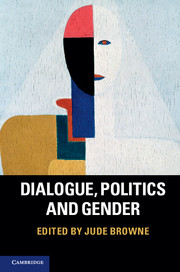 (with Phil Parvin) in Jude Browne (ed.) Dialogue, Politics and Gender (Cambridge University Press, 2013).
(with Phil Parvin) in Jude Browne (ed.) Dialogue, Politics and Gender (Cambridge University Press, 2013).This paper claims that a focus on gender as a source of controversy, and on feminism as a theoretical and practical approach, prompts a rethinking of the role of dialogue away from the liberal constitutionalist focus of deliberative democracy and towards a more fluid, reflexive approach.
- all posts on culture and religion, all posts on feminism, all posts on liberalism, all posts on social construction, all posts on the body and beauty, beauty, feminism, liberalism, multiculturalism and religion, Sex, Culture, and Justice, social construction, the body
Sex, Culture, and Justice: The Limits of Choice
Sex, Culture, and Justice: The Limits of Choice was published in hardback and paperback by Penn State University Press in 2008. An e-book is also available. You can buy all versions here.
Autonomy is fundamental to liberalism. But autonomous individuals often choose to do things that harm themselves or undermine their equality. In particular, women often choose to participate in practices of sexual inequality-cosmetic surgery, gendered patterns of work and childcare, makeup, restrictive clothing, or the sexual subordination required by membership in certain religious groups. In this book, Clare Chambers argues that this predicament poses a fundamental challenge to many existing liberal and multicultural theories that dominate contemporary political philosophy. Chambers argues that a theory of justice cannot ignore the influence of culture and the role it plays in shaping choices. If cultures shape choices, it is problematic to use those choices as the measure of the justice of the culture. Drawing upon feminist critiques of gender inequality and poststructuralist theories of social construction, she argues that we should accept some of the multicultural claims about the importance of culture in shaping our actions and identities, but that we should reach the opposite normative conclusion to that of multiculturalists and many liberals. Rather than using the idea of social construction to justify cultural respect or protection, we should use it to ground a critical stance toward cultural norms. The book presents radical proposals for state action to promote sexual and cultural justice.
Amazon UK: http://www.amazon.co.uk/Sex-Culture-Justice-Limits-ebook/dp/B001UE6M1G/
Amazon US: http://www.amazon.com/Sex-Culture-Justice-Limits-ebook/dp/B001UE6M1G/
Reviews
“[A]n interesting, important, wide-ranging and well-argued book that contains a controversial proposal that will, no doubt, be widely debated.”
—Times Higher Education“[A]n important book. … Very few first-rate analytical thinkers … engage with social theorists: Chambers is a notable exception, and if only for that reason, her contribution should serve as a model for any endeavour of this kind. … Moreover, its strength lies not merely in the author’s mastery of two disparate intellectual traditions, but also in its cogent and provocative defence of a number of proposals.“
—Philosophy“[E]xtremely successful. … Testament to her scholarly rigour, Chambers skilfully avoids alienating either side of the academic divide [between analytical and continental philosophy]; achieving her stated aim, she undermines the foundations upon which such divides are rooted. … This opportune and tightly argued work reveals the extent to which equality and justice cannot be guaranteed by a political liberalism which venerates autonomy to the exclusion of other important values. Setting itself apart from other work in its field, this book forms, albeit on its own terms, part of the solution.”
—Feminist Theory“Chambers’ work makes a highly valuable contribution to contemporary philosophical debates. … Chambers’ work represents a great advance in attempting to forge a path between two positions which are so often considered to be diametrically opposed. The project … is a vital one. … [T]he value of the theoretical contribution, both to liberal and feminist philosophy, is indisputable.”
—Res Publica“Her interwoven arguments … are complex, meticulous and inventive. … [T]here is real potential here for this book to alter mainstream liberal thinking.”
—Feminist Review“An incisive, well-written book with a sustained, original argument.”
—Ruth Abbey, University of Notre Dame“The book contributes significantly to the literature of liberalism, autonomy, and feminism.”
—Ann Cudd, University of Kansas“Chambers’ refreshing approach has the potential to expand the scope of conventional liberal theory by showing how liberals can (and should) directly meet the challenge of postmodern approaches and by demonstrating that feminist contributions are the well from which most innovations in liberalism are drawn.”
—Avigail Eisenberg, University of Victoria -
Gender
Catriona McKinnon (ed.) Issues in Political Theory (Oxford University Press, 2008, 2nd edition 2011).
This textbook from OUP introduces the key issues and themes in political theory
through chapters and case studies written by a variety of international political philosophers. My chapter on gender discusses issues such as the varieties of feminism, the family and care, sex and violence, legal equality, and has a special case study on pornography. -
Masculine domination, radical feminism and change
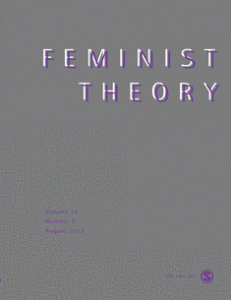 Feminist Theory Vol. 6 No. 3 (December 2005).
Feminist Theory Vol. 6 No. 3 (December 2005).This article argues that the feminist turn to Pierre Bourdieu in an attempt to conceptualise the tension between freedom and agency is helpful, but is made more so when the similarities between the work of Bourdieu and radical feminist Catharine MacKinnon are noticed. MacKinnon’s strategies for change, particularly consciousness-raising, are well suited to a Bourdieuean approach.
You can read the paper here.
- all posts on culture and religion, all posts on feminism, all posts on the body and beauty, articles, feminism, liberalism, multiculturalism and religion, the body
Autonomy and equality in cultural perspective: Response to Sawitri Saharso
 Feminist Theory Vol. 5 No. 3 (December 2004).
Feminist Theory Vol. 5 No. 3 (December 2004).This paper criticises Sawitri Saharso’s argument that hymen repair surgery and sex-selective abortion can be both multiculturalist and feminist policies.
You can read the paper here.
- all posts on culture and religion, all posts on feminism, all posts on liberalism, all posts on social construction, all posts on the body and beauty, articles, beauty, feminism, the body
Are breast implants better than female genital mutilation? Autonomy, gender equality and Nussbaum’s political liberalism
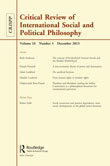 Critical Review of International Social and Political Philosophy (CRISPP) Vol. 7 No. 3 (Autumn 2004).
Critical Review of International Social and Political Philosophy (CRISPP) Vol. 7 No. 3 (Autumn 2004).This paper outlines two forms of autonomy, and argues that political liberals such as Martha Nussbaum wrongly prioritise second-order autonomy. As a result, they cannot provide adequate criticism of unjust social norms. The two cases of breast implants and female genital mutilation are compared to illustrate this point.
